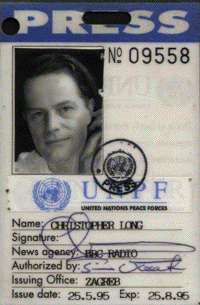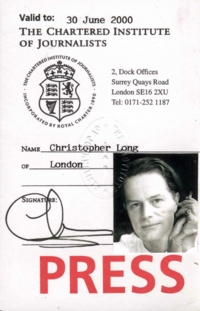NATO Strikes On Serbia?
B-Sky TV – Studio Notes – 09-10-1998
 By mid-October 1998, after seven months of conflict, the humanitarian crisis in Kosovo(a) was reaching desperate proportions. Hundreds of thousands of Kosovan refugees had fled Serb troops and paramilitary police and an estimated 50,000 refugees were living rough in mountain forests. Their only protection, the Kosova Liberation Army (KLA) had been routed and allegations of widespread Serb genocide and atrocities on the civilian 'Albanian Muslim' population were being confirmed by reliable eye-witnesses. It was now appearing increasingly likely that Nato might carry out its threat to launch air strikes on Serbian military assets in order to impose its will on President Milosevic's government in Belgrade.
By mid-October 1998, after seven months of conflict, the humanitarian crisis in Kosovo(a) was reaching desperate proportions. Hundreds of thousands of Kosovan refugees had fled Serb troops and paramilitary police and an estimated 50,000 refugees were living rough in mountain forests. Their only protection, the Kosova Liberation Army (KLA) had been routed and allegations of widespread Serb genocide and atrocities on the civilian 'Albanian Muslim' population were being confirmed by reliable eye-witnesses. It was now appearing increasingly likely that Nato might carry out its threat to launch air strikes on Serbian military assets in order to impose its will on President Milosevic's government in Belgrade.
Nato was demanding that Belgrade comply with the terms of UN Resolution 1199 and that Milosevic withdraw his troops from Kosovo, allowing access to military observers and humanitarian organisations while permitting the refugees to return in safety to their destroyed villages and houses. Significantly too the International Criminal Tribunal (Former Yugoslavia) in the Hague had asserted its right to send investigators to pursue alleged war crimes in Kosovo.
 "Like Saddam Hussein in Iraq, President Milosevic of rump Yugoslavia stays in power so long as he heads a state in a perpetual and paranoid state of crisis. He needs festering, nationalistic and apparently threatening conflicts a safe distance from Belgrade in order to survive."
"Like Saddam Hussein in Iraq, President Milosevic of rump Yugoslavia stays in power so long as he heads a state in a perpetual and paranoid state of crisis. He needs festering, nationalistic and apparently threatening conflicts a safe distance from Belgrade in order to survive."
"Air attacks by Nato on Serb assets in Kosovo(a) and/or Serbia play into Milosevic's hand, securing his position. But at the same time Nato has to be seen to 'do' something to satisfy public outrage at the atrocities Serbia's nationalist racism have spawned."
"However, no Nato member supports the aspirations of the majority of Kosovo's Albanian Muslim's (who constitute 90% of the Kosovo population). They want nothing less than complete independence from Serbia and are increasingly unwilling to settle for the mere 'semi-autonomous' status they had before Milosevic stripped them of this right in Spring 1989. And Nato member states are opposed to inserting ground troops into Kosovo(a) to enforce the West's will while Serbian troops remain there. They fear an open-ended commitment, finding themselves trapped between two warring factions, being forced to take sides and being unable to extricate themselves if their position becomes untenable."
"But it's hard to see what the West hopes to achieve from purely airborne strikes. And harder still to see how any of this will assist the freezing, hungry, homeless refugees camping out in the mountains who will have no protection should Milosevic choose to continue his genocide and mass expulsions."
"Without a rapid resolution of the conflict, however, a huge humanitarian disaster is looming. Kosovo's winters come very fast and are bitterly cold. Its geographical and political position also presents a far more difficult logistical problem for relief agencies."
"In fact the fighting season is now over for this year and Milosevic loses nothing by withdrawing his troops as he now claims he's doing. He would have withdrawn them anyway. Past experience shows that by next Spring, when the current crisis has been forgotten, the thugs among Serbia's troops and special police may well continue their work – before the refugees have been able to rebuild their shattered villages, towns and houses and, vitally, before the KLA can re-group and re-deploy."
"Air strikes may make us all feel better but Milosevic will undoubtedly win a moral victory (in Serb eyes) if strikes do not occur – and a political victory in the polls if they do."
Four days later a US envoy claimed to have extracted sufficient guarantees of Milosevic's willingness to comply with Nato and UN demands. The threat of air strikes receded. This came as no surprise to seasoned journalists, however. They had already detected a clear unwillingness on the part of the Nato allies – and the US in particular – to carry out their threat of air attacks. Milosevic too would have detected a less than wholly committed Western response.
It appeared that, with blunt sabres rattling, the West was being led down the familiar and well-trodden path seen so often before in Bosnia 1992-95. The West would deploy its sleek and deadly diplomats against the bemused but unworried Serbian military regime! A daring game of brinkmanship would ensue, resolving and changing nothing. President Milosevic would appear to his people to have won the battle. The West's massive military forces would be deployed on perpetual standby in the wings until a role could be found for some of these supposed fighting forces as social workers and diplomats. Meanwhile the cause and the creators of the original conflict would remain untouched!
© (1998) Christopher Long. Copyright, Syndication & All Rights Reserved Worldwide.
The text and graphical content of this and linked documents are the copyright of their author and or creator and site designer, Christopher Long, unless otherwise stated. No publication, reproduction or exploitation of this material may be made in any form prior to clear written agreement of terms with the author or his agents.
















